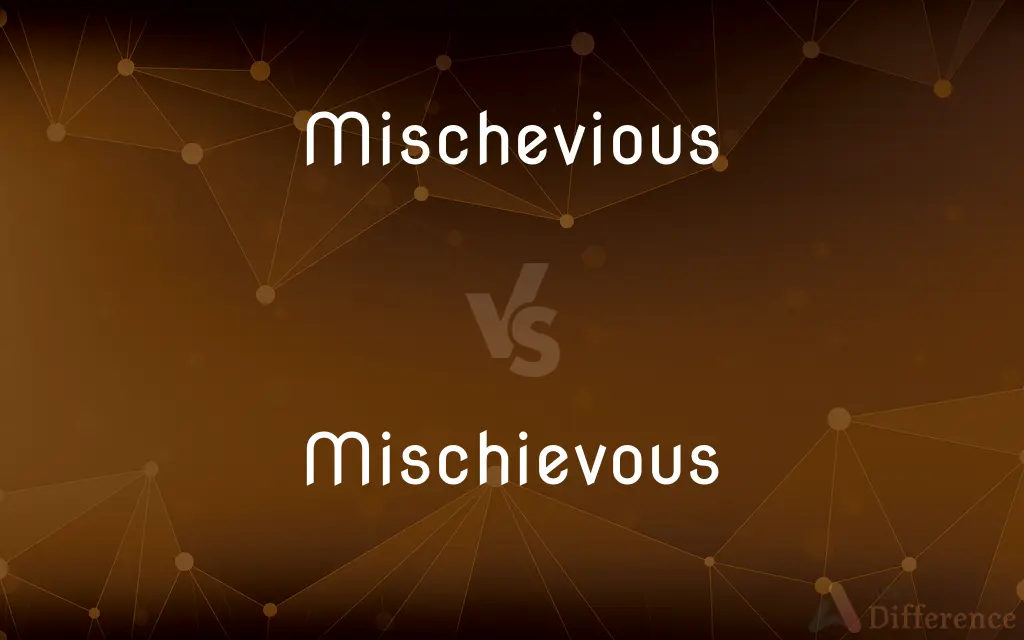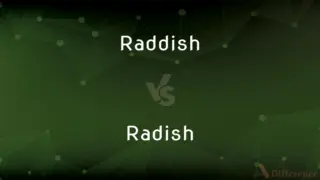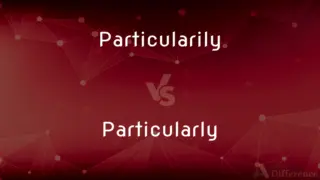Mischevious vs. Mischievous — Which is Correct Spelling?
Edited by Tayyaba Rehman — By Fiza Rafique — Updated on April 4, 2024
"Mischevious" is an incorrect spelling. The correct spelling is "Mischievous," which refers to causing mischief or playfully causing trouble.

Table of Contents
Which is correct: Mischevious or Mischievous
How to spell Mischievous?

Mischevious
Incorrect Spelling

Mischievous
Correct Spelling
ADVERTISEMENT
Key Differences
The word ends with "ous," a common adjective ending.
Remember "chief" in "mischievous," as a mischievous person might be the "chief" troublemaker.
The word "mischief" is hidden inside "mischievous."
It starts with "mis-" like "mistake," hinting at the playful errors.
There's no extra "i" before the "ous."
ADVERTISEMENT
How Do You Spell Mischievous Correctly?
Incorrect: They found the puppy's mischevious antics adorable.
Correct: They found the puppy's mischievous antics adorable.
Incorrect: Her mischevious plan to surprise her friend worked perfectly.
Correct: Her mischievous plan to surprise her friend worked perfectly.
Incorrect: The cat's mischevious grin made us all laugh.
Correct: The cat's mischievous grin made us all laugh.
Incorrect: He had a mischevious sparkle in his eyes.
Correct: He had a mischievous sparkle in his eyes.
Incorrect: The children's mischevious behavior was harmless but funny.
Correct: The children's mischievous behavior was harmless but funny.
Mischievous Definitions
"Mischievous" refers to causing or showing a fondness for causing trouble.
A mischievous grin spread across her face.
"Mischievous" describes someone playful in a slightly naughty or teasing way.
The mischievous child hid her father's shoes.
"Mischievous" might indicate being malicious or harmful.
Mischievous rumors spread through the school.
It can mean causing harm or trouble in a playful manner.
Mischievous acts during Halloween upset the neighbors.
The term can describe someone inclined to find and exploit faults in others.
His mischievous criticism wasn't well-received.
Causing or showing a fondness for causing trouble in a playful way
Mischievous children
A mischievous grin
(of an action or statement) causing or intended to cause harm or trouble
A mischievous allegation for which there is not a shred of evidence
Causing mischief.
Playful in a naughty or teasing way.
Troublesome; irritating
A mischievous prank.
Causing harm, injury, or damage
Mischievous rumors and falsehoods.
Causing mischief; injurious.
Troublesome, cheeky, badly behaved.
Matthew had a twin brother called Edward, who was always mischievous and badly behaved.
Causing mischief; harmful; hurtful; - now often applied where the evil is done carelessly or in sport; as, a mischievous child.
This false, wily, doubling disposition is intolerably mischievous to society.
Naughtily or annoyingly playful;
Teasing and worrying with impish laughter
Badly behaved;
He was saucy and mischievous in school
A naughty boy
Deliberately causing harm or damage;
Mischievous rumors and falsehoods
Mischievous Meaning in a Sentence
Mischievous students often play pranks on their teachers.
The mischievous fox found its way into the henhouse.
The mischievous kitten knocked over the vase while playing.
He wrote a book filled with tales of mischievous adventures.
Her mischievous smile hinted at the joke she was about to tell.
Mischievous elves are a common theme in fairy tales.
A group of mischievous dolphins played around the boat.
Mischievous behavior in puppies is often seen as cute.
Her mischievous nature always made gatherings more fun.
The mischievous fairy played tricks on the travelers.
Mischievous behavior can sometimes lead to unexpected friendships.
The mischievous wind seemed to play with the leaves.
A mischievous spirit is often blamed for unexplained events.
The mischievous antics of the cartoon characters delighted children.
The mischievous ghost in the story loved to hide objects.
The mischievous raccoon got into the trash again.
The mischievous child hid his brother's toy as a prank.
In many stories, ravens are depicted as mischievous creatures.
Mischievous characters often add humor to stories and movies.
Mischievous students rearranged the classroom furniture as a prank.
Mischievous Idioms & Phrases
A mischievous grin
Indicates someone is smiling with playful intent, often before doing something playful or slightly naughty.
With a mischievous grin, she hid the last piece of cake to tease her brother.
A mischievous twinkle in one's eye
Showing a hint of playful or naughty intentions through one's expression.
There was a mischievous twinkle in her eye as she planned the surprise party.
Playing the mischievous elf
Acting in a way that is playfully troublesome or prankish, much like a mythical elf.
He was playing the mischievous elf by hiding everyone's shoes during the party.
Common Curiosities
Why is it called Mischievous?
It derives from the word "mischief," indicating behavior that causes annoyance or harm.
What is the root word of Mischievous?
The root word is "mischief."
Which vowel is used before Mischievous?
The vowel "a" as in "a mischievous cat."
What is the pronunciation of Mischievous?
Mischievous is pronounced as [mɪsˈʧɪvəs].
What is the singular form of Mischievous?
"Mischievous" itself is singular.
Which conjunction is used with Mischievous?
Any conjunction can be used depending on the context, like "and" or "but."
What is the verb form of Mischievous?
There isn't a direct verb form, but related actions might be "to misbehave" or "to play tricks."
Is Mischievous a noun or adjective?
"Mischievous" is an adjective.
What is the plural form of Mischievous?
Adjectives don't have plural forms in English, so there's no plural for "mischievous."
Which preposition is used with Mischievous?
"With" as in "mischievous with his plans."
Is Mischievous an adverb?
No, but "mischievously" is the adverbial form.
Is Mischievous a negative or positive word?
It can be seen as negative or neutral, often depending on context.
Is Mischievous a vowel or consonant?
The word "mischievous" starts with a consonant.
What part of speech is Mischievous?
Mischievous is an adjective.
Which determiner is used with Mischievous?
Any determiner like "this," "that," "his," "her" can be used, depending on context.
Is Mischievous an abstract noun?
No, but "mischief" can be considered an abstract noun.
How many syllables are in Mischievous?
There are three syllables in "mischievous."
What is a stressed syllable in Mischievous?
The second syllable, "chi," is stressed.
Is Mischievous a countable noun?
"Mischievous" is not a noun, so it's not countable.
Is Mischievous a collective noun?
No, "mischievous" is an adjective.
What is the opposite of Mischievous?
The opposite might be "behaved" or "innocent."
What is the first form of Mischievous?
Mischievous itself is the basic form as it's an adjective.
How is Mischievous used in a sentence?
"The mischievous puppy tore up the newspaper."
Is the Mischievous term a metaphor?
Not inherently, but it can be used metaphorically in context.
Is the word Mischievous imperative?
No, "mischievous" is not imperative as it's an adjective.
What is another term for Mischievous?
"Playful" or "naughty."
Which article is used with Mischievous?
Both "a" and "the" can be used, e.g., "a mischievous look" or "the mischievous child."
Is the word Mischievous a gerund?
No, "mischievous" is not a gerund.
Is the word “Mischievous” a Direct object or an Indirect object?
"Mischievous" is an adjective and doesn't function as an object.
How do we divide Mischievous into syllables?
mis-chie-vous.
What is the second form of Mischievous?
Adjectives don't have conjugated forms like verbs do, so there isn't a second form.
What is the third form of Mischievous?
Similarly, adjectives don't have a third form.
Share Your Discovery

Previous Comparison
Raddish vs. Radish
Next Comparison
Particularily vs. ParticularlyAuthor Spotlight
Written by
Fiza RafiqueFiza Rafique is a skilled content writer at AskDifference.com, where she meticulously refines and enhances written pieces. Drawing from her vast editorial expertise, Fiza ensures clarity, accuracy, and precision in every article. Passionate about language, she continually seeks to elevate the quality of content for readers worldwide.
Edited by
Tayyaba RehmanTayyaba Rehman is a distinguished writer, currently serving as a primary contributor to askdifference.com. As a researcher in semantics and etymology, Tayyaba's passion for the complexity of languages and their distinctions has found a perfect home on the platform. Tayyaba delves into the intricacies of language, distinguishing between commonly confused words and phrases, thereby providing clarity for readers worldwide.







































